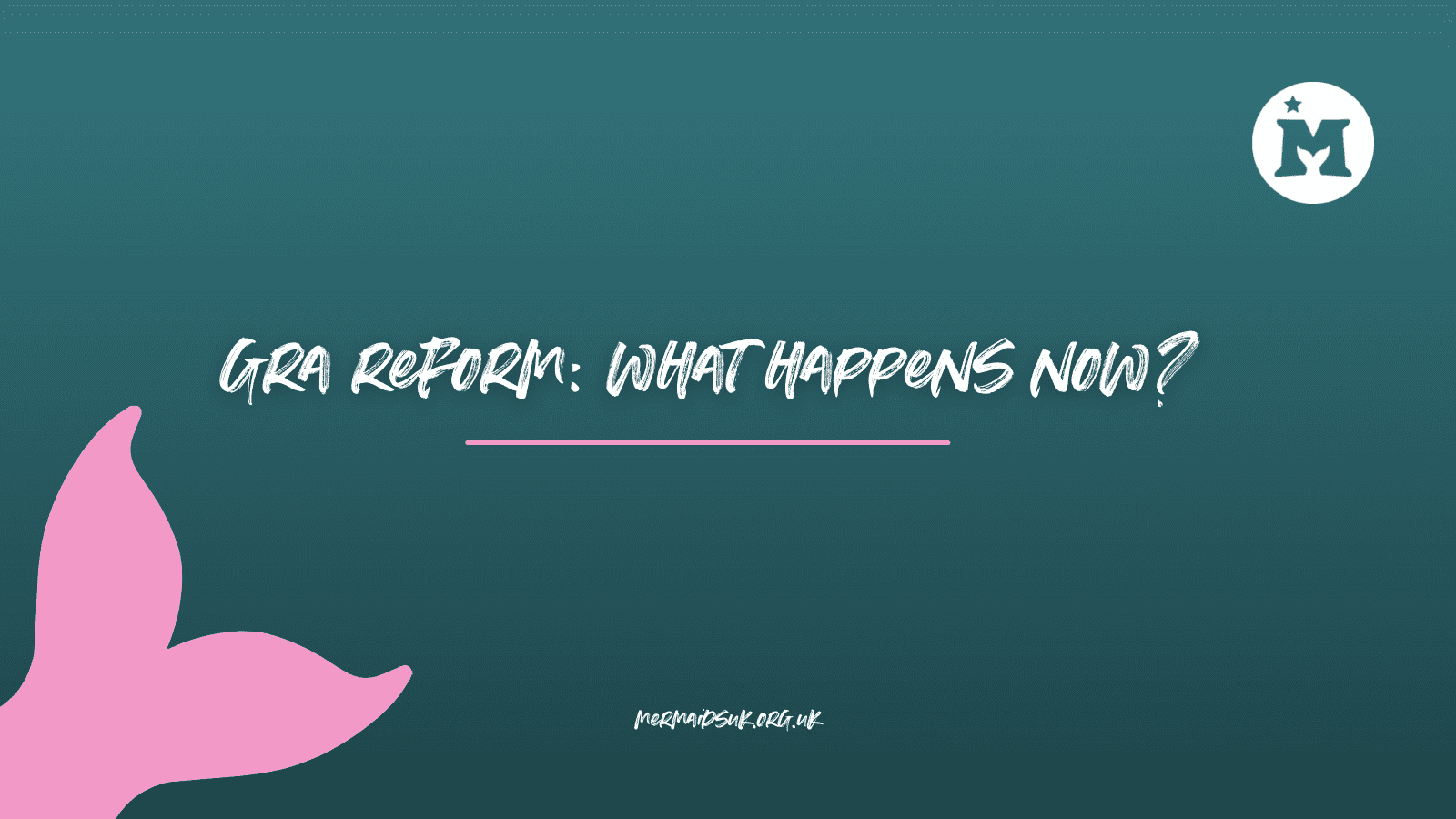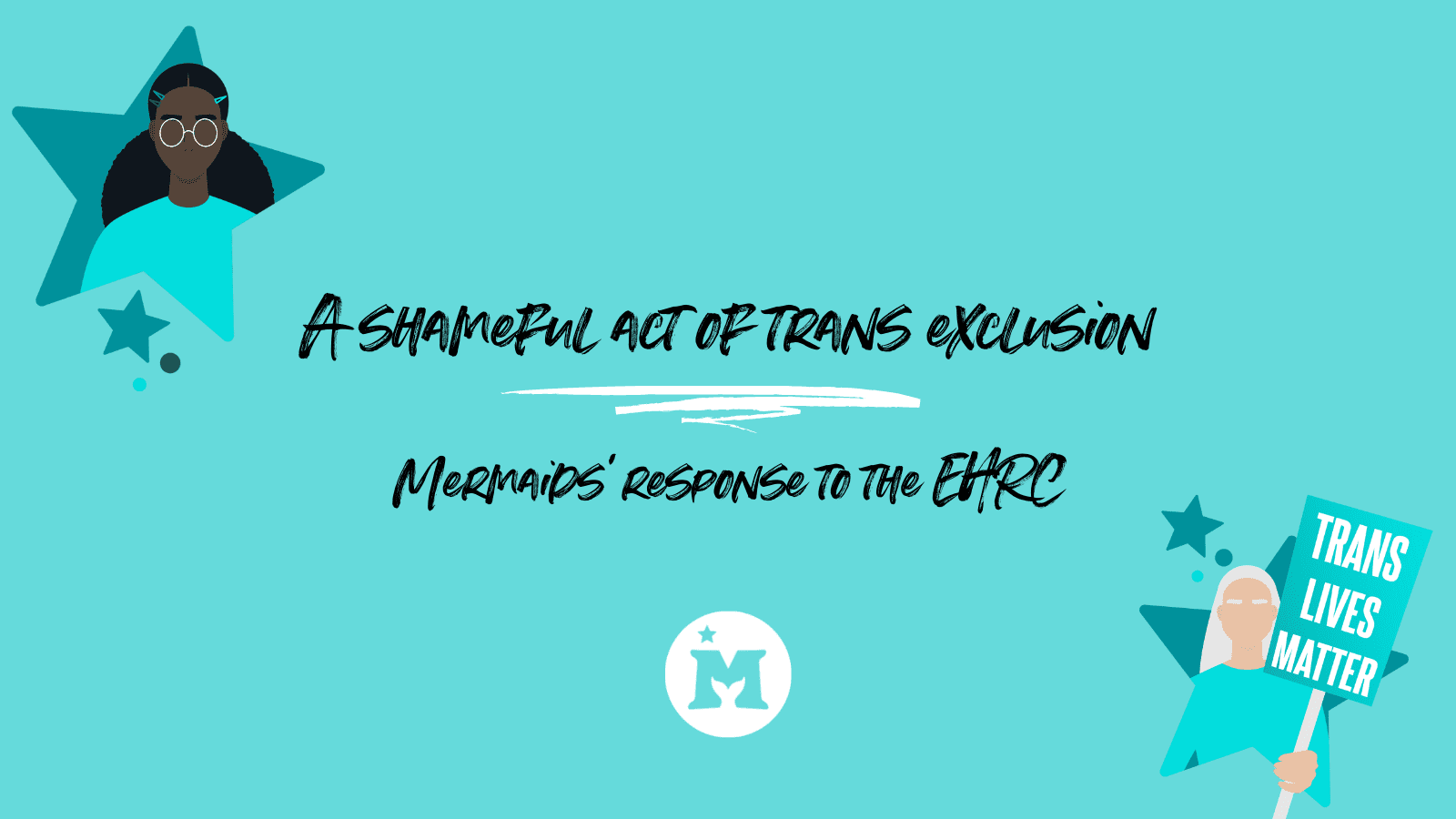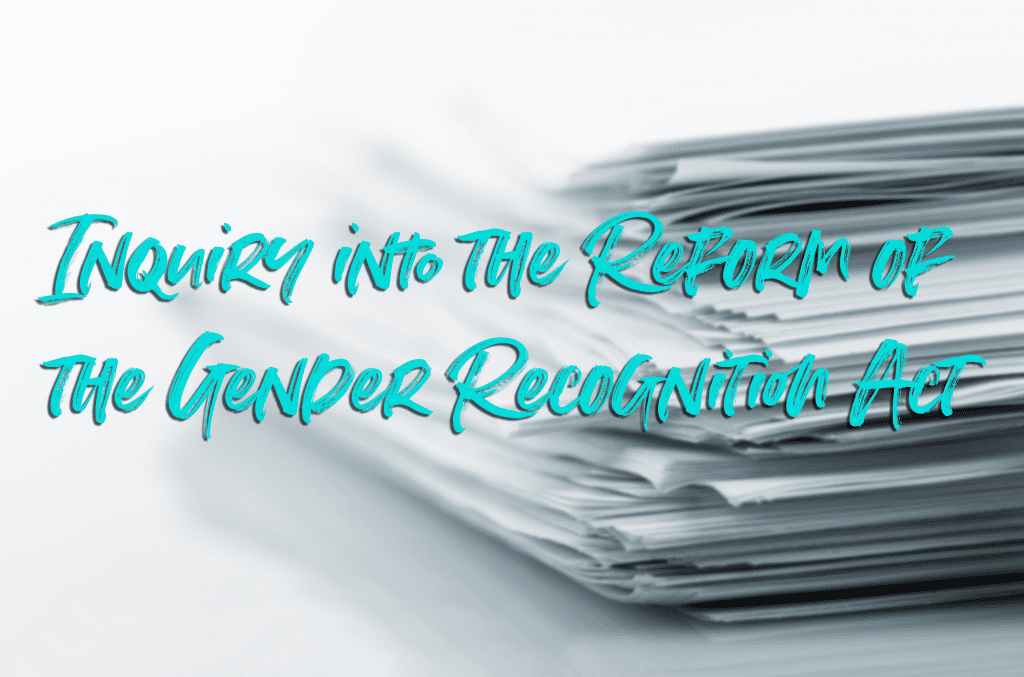Analysis from Mermaids’ legal and policy team into a new report by the Women and Equalities Select Committee into proposed changes to UK Gender Recognition legislation
We welcome the Women and Equalities Select Committee’s (WESC) report released today (Tuesday 21 December 2021) that reviews the Government response to proposed reforms to Gender Recognition legislation in the UK.
You’ll see that the WESC examined the Government’s proposals, gathering evidence on whether the Government’s proposed changes are the right ones and whether they went far enough.
The Commission were exploring what changes, if any, should be made to existing legislation, in order for current legislation to improve transgender equality.
The Committee’s report is not a short document and we have done our best to pull out some of the key recommendations of the Committee.
Key recommendations
- The report recommends a few changes to Gender Recognition legislation, including removing the requirement to live in an affirmed gender for a period of two years, removing the requirement of a diagnosis of gender dysphoria and removal of the spousal veto.
- The report calls for a review to be conducted of whether the Gender Recognition Panel could be removed and replaced with the Registrar General for England and Wales, and for interim plans to improve transparency around the Panel’s operation be made.
- The report calls for better guidance on the single-sex and separate-sex exceptions and urges the GEO and EHRC to publish such guidance “immediately”.
- The report calls on the Government to set out and commit to placing the application process online in the next six months, alongside providing a non-digitised route for those who do not have access or do not wish to apply online.
- The report found that the length of time the Government took to respond to it’s own consultation (in 2018) is “unacceptable”. It concludes that this delay exacerbate tensions between an already polarises group of stakeholders and also caused real distress to many within the transgender community.
- The report acknowledged that the GEO’s mention of “new clinics’ within their GRA reform” announcement last year “served only as a distraction from the lack of any real change to the gender recognition process”.
- The report recommends that the requirement for “spousal veto” should be removed insofar that spouses should be given the option to remain married/in a civil partnership or have it annulled.
- The report that the minimum age for those able to access legal gender recognition should remain at 18.
- The report has also recommended that section 22 of the GRA be amended to only apply when the disclosure of a person’s GRC status has been disclosed in a “deliberate and knowing” manner.
- The report calls for improved healthcare provision for transgender, non-binary and gender diverse people.
- The report calls for the Government to respond to clarify within 12 weeks on its intentions around legal identification for non-binary people and for the EHRC to conduct research to provide for legal recognition within this parliament.
- The report asks for the Government and EHRC to provide worked examples of exemptions to Equality Act protection for trans* people to ensure clarity regarding single-sex spaces, employment and sports.
- The report calls for a distinction to be made between sex and gender when collecting data and to ensure that distress for trans* people is minimised when such data is collected.
- The report calls for the Government to immediately sign up to the LGBT Action Plan and reinstate the LGBT Advisory Panel.
“Welcome and needed”: An analysis by Lui Asquith (they/them), Director of Legal and Policy
After years of difficulty that arose from the public consultation on GRA reform within which the law was confused and rights were erroneously put at odds with one another, we have a report from the Women and Equalities Select Committee that brings us hope and a request for action from this Government.
It’s a document that isn’t perfect, but what we are seeing here is movement and a willingness from the WESC to say the Government has not got it right and that it needs to do better for trans people. The Committee hasn’t gone lightly on the Government and this is a very much needed nod to a future where trans people can be.
LGBTQIA+ rights have always been difficult to acquire (that’s a reality, not an excuse to further reject our civil liberties) and what we see within this report is a committee that is willing and ready to hold our Government to account on trans equality matters, which is both welcome and needed.
Unfortunately the Committee didn’t go so far as to recommend a lowering of age around legal gender recognition, which we know to exist around the world already. What I would say to that is, it’s not surprising given the scaremongering that’s happened around trans youth particularly within the UK, but I do believe that this report is a step towards one day achieving self-ID for trans children and young people.
I do believe that this report is a step towards one day achieving self-ID for trans children and young people”
The decision around a refusal to support under 18s to self-determine their own identity is both a by-product of how we approach the child voice more generally within the UK together with a imposing a cis-normative expectation on youth, which many have to carry with them for the rest of their life.
Young trans people are people over and above anything else and they deserve the right to make their own decisions once they have the capacity to do so, just as any other person does. We can already see in other areas of law that being under 18 doesn’t mean you don’t have that capacity to make decisions for yourself – we should be allowing all young people to enjoy these human liberties. LGBTQIA+ rights and our approach to it needs to include those under 18 otherwise we are only serving one part of the population.
In a crucial move, this report says no to the pathologising of trans people and pushes the Government to consider what it can do for non-binary people.
It also doesn’t hide away from commenting on access to healthcare and calls for: “improved support to help young people seeking to transition, especially mental health support. Young people should have access to services which work in tandem with gender identity clinics and allow them to discuss and explore their feelings about transitioning in detail. We welcome the work being undertaken in the Cass Review and look forward to reading its findings.”
At Mermaids, we have been witnessing an ocean of distress that has been coming from a lack of healthcare provision for young trans and gender exploring people. We are relieved that this has been plainly acknowledged within this report. We have young people waiting several years before they are seen and supported and it isn’t good enough – it needs to change and this report agrees.
Lui was quoted throughout the report, following their oral evidence session in March 2021
- On the supposedly “new” clinics referred to by the Minister Liz Truss’ in their announcement of the “reforms” last year following the consultation: “Similarly, Lui Asquith, Director of Legal and Policy at Mermaids, a charity supporting transgender, non-binary and gender-diverse children and young people, told us that ‘they are not deemed new clinics’ and that Mermaids ‘understand them to be pilot schemes’.”
- On the spreading of misinformation around the GRA and Equality Act 2010: “Lui Asquith from Mermaids, told us: ‘The delay added fuel to the confusion, which we referred to earlier, between the Equality Act and the Gender Recognition Act. Incorrect information was put out. At the time, it added to the idea that this erroneous information was correct. That was a huge problem…’ We were repeatedly told about the negative impact of the Government’s delayed response on many transgender people. Lui Asquith told us that, during this period, there was a ‘dangerous move to questioning the existence of trans people within this country’, and that there was ‘no unequivocal message from the Government to say, ‘This is where we stand. We include trans people and we will not tolerate intolerance’. This was reiterated by Nancy Kelley from Stonewall, who said that the length of time the consultation was open for and the length of time it took for the Government to respond, ‘allowed anti-trans mobilisation to happen’”.
- On the lack of action taken by the Equality and Human Rights Commission in support of GRA reform: “At Mermaids, we hear about a feeling of a lack of advocacy from the commission. Obviously, the commission is commissioned to stand up for those with protected characteristics, one of which is those subject to the gender reassignment section. Quite frankly, those who are protected by that section currently do not feel as though the commission is standing up for them as much as they would like. There is huge disappointment, but there is a commitment to wanting to work with the commission and change that. I suppose the feeling around the commission, certainly from the trans population, will only change through public action. We hope to see that in the near future.“
- On why those under 18 years old should have access to legal gender recognition: “’We believe that those who are under 18 should also have access to legal gender recognition. From a very clinical perspective, it would simply allow this system to align with other state systems, the obvious example being the passport system. If a young trans binary individual wishes to change their gender marker, there is the opportunity for them to do that. This system is currently incompatible with other state systems’. They continued by setting out what impact the lack of legal recognition can have on young trans people: ‘The indirect impact of the current system not acknowledging young people strikes to the heart of the well-being of young trans, non-binary and gender variant people. It has an impact on their everyday because it simply increases the risk of young people being outed unwantedly in their everyday life, school settings, healthcare settings and general social settings. This exposes an individual to a risk of harm, harassment and discrimination that we simply should not allow for in wider society.‘”
Find out more about our legal and policy work here.




